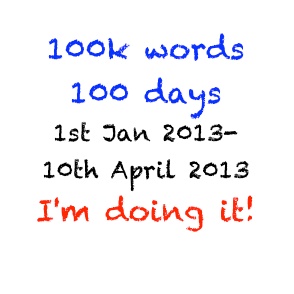It’s New Year, and despite the fact I don’t make New Year Resolutions these days (thereby avoiding the guilt trips I have suffered in the past when the resolutions get broken within a week or two), I’m up for a writing challenge.
And there’s no better challenge than my old mate Sally Quilford’s 100k in 100 days challenge. The idea has some similarities to NaNoWriMo, in that there is a word count target at the end of the period – i.e. 100,000 words in 100 days. Mathematicians amongst you will probably soon be working at that this means 1,000 words per day, which is much less stressful than NaNoWriMo’s 1,667 words per day average. Still, that’s about four pages of a paperback novel, which doesn’t sound too onerous, does it? But definitely worth doing. By mid-April, you’ll have enough of a first draft written to enable you to edit it down by 20%, and still have an 80,000-word novel to send out or publish.
The other difference is that Sally allows writers to use creative writing from other destinations, not just on one ‘novel’. You can include blog posts (as long as it’s about writing), writing articles, short stories, poems, and stuff like that. Again, it’s to reduce the stress and the pressure, and allow you more freedom in choosing your writing. The main idea is that it keeps you writing.
I’ve created a little spreadsheet on the internet for people to log their word counts. Simple enough, but the first place I chose to host the spreadsheet was very unreliable. The fact that their blog hasn’t been updated since 2009 doesn’t exactly engender confidence, either. After a second hiccup, another writer from the group suggested Google docs. I had been confused by Google telling me I needed to download Google Drive (which I did, but which isn’t appropriate for everyone to do). But, on further investigation, that was just to allow easier uploading / archiving, and Google Docs works pretty much as it always has done. So the word count spreadsheet resides on Google’s massive servers.
So, how are we doing, four-and-a-bit days into the challenge? So far (as I type this) – which will, of course, count towards my daily total 😉 – the group has recorded over 279,000 new words written, across the 89 users currently listed on the spreadsheet. An amazing total! Personally, I’ve taken my Performance Enhancing Drugs (Christmas cake and coffee), and am aiming for double the average, and trying to write 2,000 words per day. After 4 days, I’m sitting at 8,874 words, most of which are in a new novel wth a working title of The History of Things To Come. The subject is the end of the world, for which the December 21st date has come and gone. This book, which is fiction of course, shows why that date was incorrect, and more importantly, names the REAL date. Death and destruction all the way. It’s a thriller, in case you can’t guess.
In the next blog post, I will list some of my coping mechanisms / tips for writing challenges. I’m an 8-times ‘winner’ of NaNoWriMo, and I’ve discovered things that work, and a lot of things that don’t. I hope you’ll join me then.

